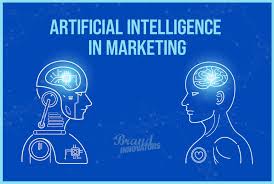Artificial Intelligence: A Revolution in Marketing
Executive Summary
Artificial Intelligence (AI) is rapidly transforming the landscape of marketing, offering unprecedented opportunities to enhance customer experiences, optimize campaigns, and drive business growth. This white paper explores the multifaceted applications of AI in marketing, from personalized customer experiences to predictive analytics and automated content creation. By leveraging AI's power, marketers can gain a competitive edge, increase efficiency, and achieve remarkable results.
Introduction
In today's data-driven world, marketers are inundated with vast amounts of information. AI provides the tools to harness this data, extract valuable insights, and make data-driven decisions. By automating repetitive tasks, AI frees up marketers to focus on strategic initiatives, fostering creativity and innovation.
AI in Marketing: Key Applications
- Personalized Customer Experiences
- AI-Powered Personalization:
- Analyze customer behavior and preferences to deliver tailored content and recommendations.
- Utilize machine learning algorithms to segment customers based on demographics, interests, and purchase history.
- Create personalized product recommendations and marketing messages.
- Chatbots and Virtual Assistants:
- Enhance customer service and support through 24/7 availability.
- Provide instant answers to customer queries and resolve issues efficiently.
- Offer personalized product recommendations and assistance.
- Predictive Analytics
- Customer Segmentation:
- Identify and target specific customer segments with tailored marketing campaigns.
- Predict customer behavior and preferences to optimize marketing efforts.
- Demand Forecasting:
- Forecast future demand for products and services to optimize inventory management and production planning.
- Anticipate market trends and adjust marketing strategies accordingly.
- Churn Prediction:
- Identify customers at risk of churning and implement targeted retention strategies.
- Proactively address customer concerns and improve satisfaction.
- Automated Content Creation
- AI-Generated Content:
- Create high-quality content, such as product descriptions, blog posts, and social media updates.
- Automate content generation for a variety of platforms and channels.
- Content Personalization:
- Tailor content to individual preferences and interests.
- Deliver relevant and engaging content to each customer.
- Marketing Automation
- Email Marketing Automation:
- Send targeted email campaigns based on customer behavior and preferences.
- Automate email workflows, such as welcome emails, abandoned cart reminders, and post-purchase follow-ups.
- Social Media Marketing Automation:
- Schedule social media posts, monitor brand mentions, and engage with followers.
- Analyze social media data to identify trends and opportunities.
- Ad Targeting and Optimization
- Precise Targeting:
- Reach the right audience with highly targeted ad campaigns.
- Utilize AI-powered targeting algorithms to identify potential customers.
- Ad Optimization:
- Continuously optimize ad performance by analyzing real-time data.
- Adjust bids, ad copy, and targeting to maximize ROI.
Challenges and Considerations
- Data Quality and Privacy:
- Ensure data accuracy and integrity to make informed decisions.
- Comply with data privacy regulations, such as GDPR and CCPA.
- AI Bias and Fairness:
- Address potential biases in AI algorithms to avoid discriminatory outcomes.
- Promote fairness and inclusivity in AI-powered marketing.
- Ethical Considerations:
- Use AI responsibly and ethically to build trust with customers.
- Avoid manipulative or misleading marketing practices.
Conclusion
AI is revolutionizing the marketing industry, empowering businesses to achieve unprecedented levels of personalization, efficiency, and effectiveness. By embracing AI, marketers can unlock new opportunities, drive growth, and stay ahead of the competition. As AI continues to evolve, it is crucial for marketers to adapt to emerging technologies and embrace the future of marketing.
References
Artificial Intelligence for Marketing- Jim sterne
Note: To create a truly comprehensive and exhaustive white paper, it's essential to conduct in-depth research and incorporate specific examples and case studies from leading companies that have successfully implemented AI in their marketing strategies.
Would you like to delve deeper into any specific aspect of AI in marketing, such as a particular use case or technical implementation?



